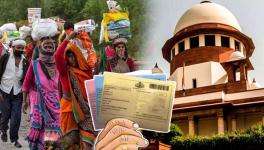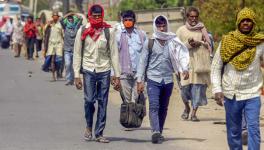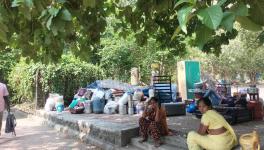Mumbai: With a Lockdown Extension Likely, People on the Margins Stare at Poverty
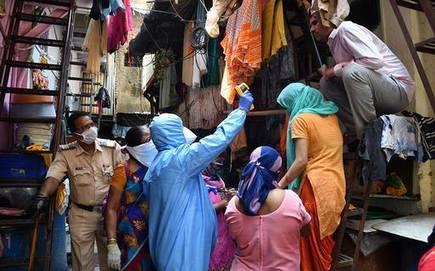
Representational image. I Image Courtesy: Hindu Business Line
Dipali Yadav lives with her only daughter in Sangram Nagar in Dharavi, Mumbai. She works as a helper in a mess and in three houses. For the past 55 days however, she has not been at work due to the lockdown. Dipali earns Rs 6,500 per month from her work engagements. After hearing about the possibility of an extension of the lockdown till the end of May, Dipali had tears in her eyes. “How will we survive? We have nothing left at home. I wish the government will at least allow us to work," she said.
The Maharashtra government is planning on extending the lockdown to May 31 from the earlier date of May 17. As the number of COVID-19 patients grows in the state, particularly in cities like Mumbai and Pune, the state government is worried. It is now increasing restrictions in the red zone areas to prevent further spread of the novel coronavirus. However, the proposed move has resulted in increasing a sense of fear among economically disadvantaged people, including daily wagers, labourers and domestic help in Mumbai.
"I am a heart patient and the doctor has advised me to undergo treatment. But I cannot go now. I do not have money. I have to pay Rs 1500 as rent for my room and look after my daughter. She is in the twelfth standard now. Unless the government gives us permission to work, at least in the mess, it will be difficult to survive," said Dipali.
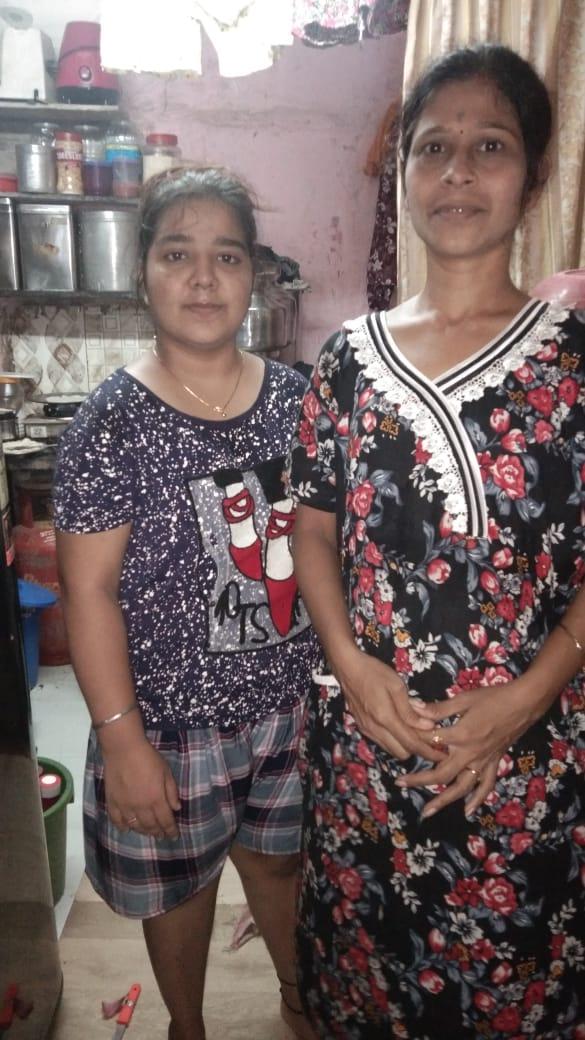
Dipali Yadav and her daughter Shrutika Yadav.
Dipali is not alone. There are lakhs of people in the state who are worried about basic needs, including food. As of now the government is providing them with ration. Packets of cooked food are also being distributed in areas like Dharavi. But how long would they survive on handouts? "Nobody likes to live like a beggar. We earn and live with respect," said Dipali.
Sunil More is an auto-rickshaw driver from Kalyan's Kolsewadi area. He has been driving his auto for over twenty years now. For the last fifty days, Sunil has not taken his auto out on the road and is running out of savings. His family consists of two sons and his wife. An extension of the lockdown will force him to stand in the queue for food packets.
"I would have taken my auto out. However, the customers we encounter are looking to cover long distances to reach their villages, over 200 kms to 300 kms away. Some even ask us to go as far as Uttar Pradesh. But that is illegal. If the police starts issuing fines then whatever we earn would be lost in paying fines. So, I am staying back home," said Sunil.
He is worried about the school fees for his sons, and money for daily needs. “One at least needs enough for rice, pulses and achaar (pickle). But we do not have the money to buy these things. I have already borrowed some money from friends to pay the local grocer. The government should find a way to give us relief," Sunil added.
Their occupations may differ, but the stories do not. Already living on the margins, the lockdown has pushed many families to the brink of poverty.
Shabbir Mansoor is a truck driver from Kausa's Himmat Nagar. He was supposed to leave for Gulbarga in Karnataka with a shipment of goods on March 23. Shabbir could not leave and lockdown began, leaving him out of work since. The owner of his truck paid him for March and gave him half his salary for the month of April. However, the lockdown persists and Shabbir is in Thane, a designated red zone.
"I have two daughters, a son, and my mother stays with me. We are a family of six. I do not have a salary for the month of May and half of April’s salary. I am seriously worried about how I will feed my children. If I cannot earn anything, we will be left at the mercy of the government," said Shabbir, his voice trembling over the phone. "I thought the lockdown would end by May 17, but there is no sign of that happening. I will have to take a risk and start ferrying migrants to other states. At least that would bring me some money," said Shabbir.
Sadhana Hadad stays in a labour camp at Matunga, making her living as a washerwoman. She is the sole breadwinner of her family of four people which includes her mother, a son and a daughter. During times of normalcy, she used to wash the clothes of waiters from hotels and labourers from industries in the Dharavi and Wadala area. However, with hotels and industries not functional and no one coming in to work, Sadhana's earnings have also stopped.
"These days I get food packets from the BMC. I do not have money to buy anything, neither vegetables nor grain. For a few days, some people from an NGO came with food packets. But for how many days can we survive like this? We will have to work. The government may give us food but we will have to pay rent, the electricity bill, buy medicines and fulfill the needs of our children. One needs money for that. Until this lockdown is over, there is no hope of making money," said Sadhana.
The aforementioned are just four examples that shed light on the situation of the lesser advantaged in Mumbai. While the government may give them food, they have other needs to take care of. They need money to survive and there is no other source of income for them until the lockdown is in place.
Get the latest reports & analysis with people's perspective on Protests, movements & deep analytical videos, discussions of the current affairs in your Telegram app. Subscribe to NewsClick's Telegram channel & get Real-Time updates on stories, as they get published on our website.










